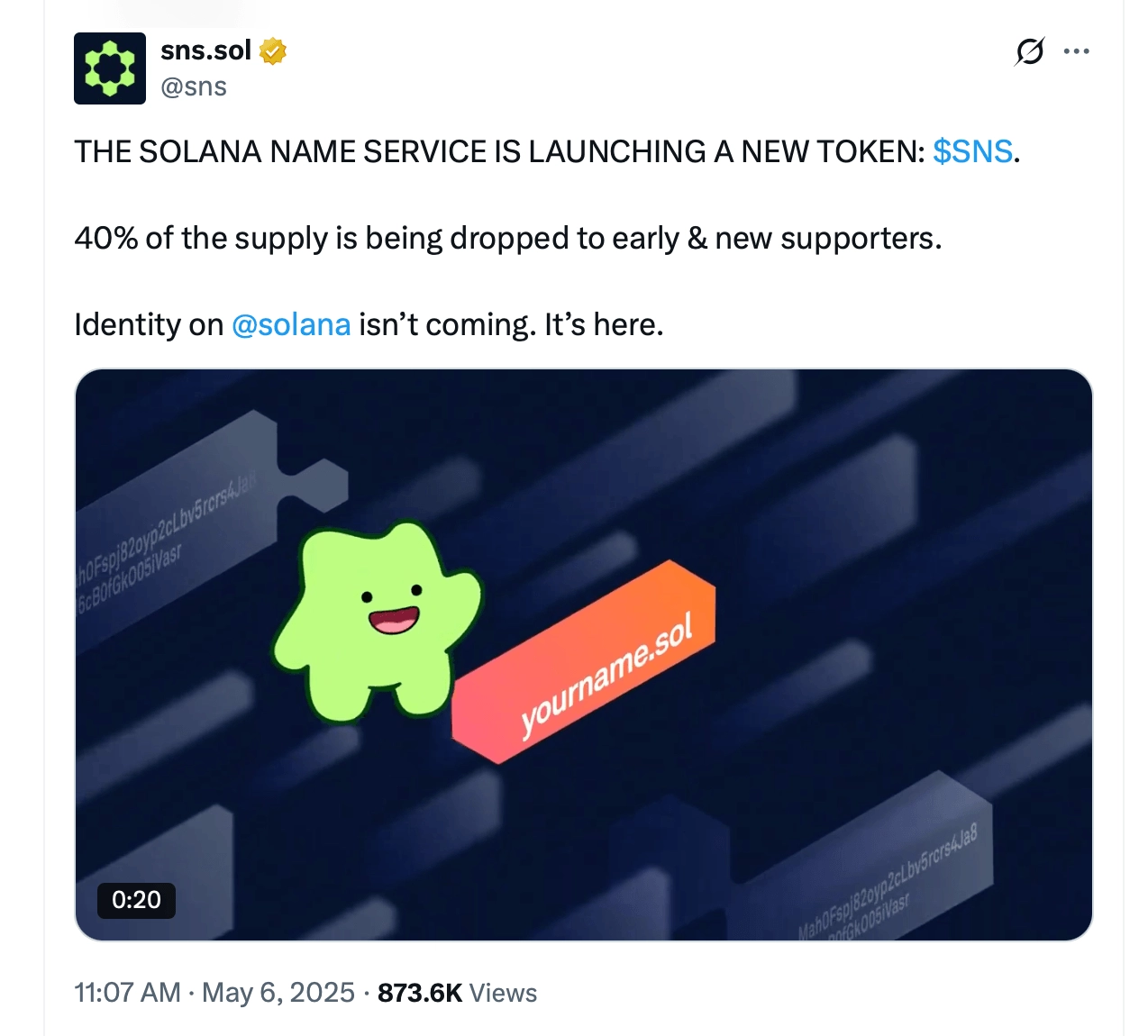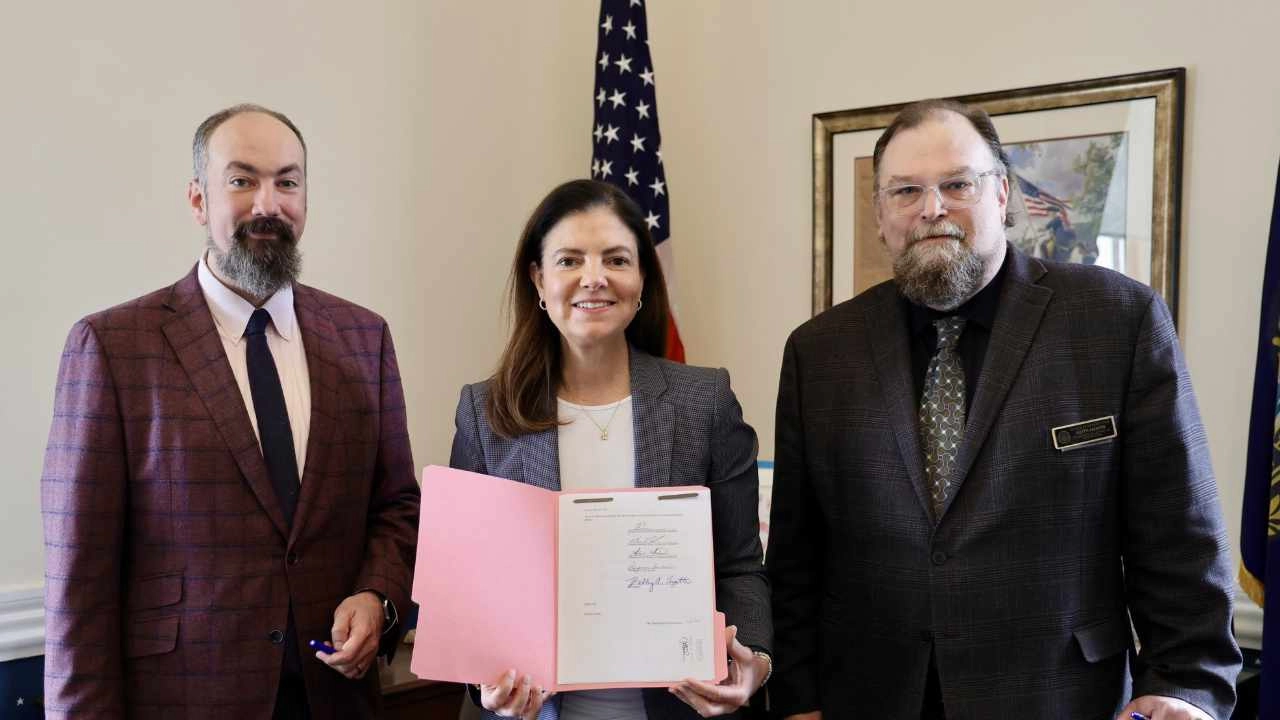Solana Name Service Launches SNS Token to Boost Community Governance
The Solana Name Service (SNS), a decentralized naming protocol on the Solana blockchain, has launched its SNS token to decentralize governance and align the project’s future with its user community.

Solana Naming Protocol Launches Governance Token with 10 Billion Supply
The SNS token, with a total supply of 10 billion, is designed to grant .sol domain holders decision-making power over protocol upgrades, ecosystem incentives, and development priorities. Its distribution allocates 40% to existing .sol holders, Solana communities, and partners, emphasizing rewards for early adopters.

Another 20% is reserved for future community incentives, while 26.25% will fund ecosystem growth through partnerships and projects. Core contributors receive 8.75% (locked for four years), and 5% is allocated to liquidity pools.
SNS aims to simplify blockchain interactions by converting complex wallet addresses into human-readable .sol domains, such as “username.sol.” These domains serve as digital identities, enabling streamlined transactions, decentralized website hosting, and integration with Web3 applications. Subdomains further expand utility, supporting community structures, organizational hierarchies, and decentralized physical asset management.
Solana Name Service explained that key advantages include perpetual ownership of domains, low transaction fees via Solana’s infrastructure, and seamless ecosystem integration. Over 270,000 .sol domains have been registered to date, with 150 projects leveraging the protocol for user-friendly blockchain access.
The token’s governance framework, according to the white paper, allows holders to vote on proposals, including funding allocations and technical upgrades. SNS aims to foster a self-sustaining ecosystem where active participation is incentivized through token rewards tied to usage and contributions.
Future steps include phased token claims for eligible users and detailed guidance for community involvement. The rollout aims to highlight SNS’s shift toward a decentralized model, prioritizing long-term resilience and user-driven innovation.
First State Bitcoin Reserve Law Passed—NH Clears Treasury to Buy Crypto
New Hampshire has ignited a financial revolution by becoming the first U.S. state to greenlight strategic bitcoin investments, unlocking public treasury access to top-tier digital assets.

State Treasury Gets Green Light to Invest in Bitcoin Under Groundbreaking Law
The U.S. state of New Hampshire has become the first in the nation to authorize the creation of a strategic bitcoin reserve, following the enactment of House Bill 302 into law. Signed by Governor Kelly Ayotte on May 6, the legislation allows the state to invest public funds in bitcoin and other high-cap digital assets.
The initiative is based on a policy model developed by the nonprofit Satoshi Action Fund and is intended to protect taxpayer money, diversify the state’s reserves, and modernize its fiscal strategy. The law also includes provisions to ensure secure asset custody and limits digital asset exposure to 5% of total state funds. Governor Ayotte announced the signing on social media platform X, stating:
New Hampshire is once again first in the nation! Just signed a new law allowing our state to invest in cryptocurrency and precious metals.
The bill authorizes the state treasurer to acquire bitcoin and other digital assets with market capitalizations exceeding $500 billion, which currently includes only bitcoin. According to Satoshi Action CEO Dennis Porter: “Satoshi Action drafted the model, New Hampshire engraved it into law, and now every treasurer nationwide can follow that roadmap.” He continued: “HB 302 proves you can protect taxpayer money, diversify reserves, and future-proof state treasuries—all while embracing the most secure monetary network on Earth. New Hampshire didn’t just pass a bill; it sparked a movement.”
Support for the law was echoed by the New Hampshire House Republicans, who declared on social media platform X:
New Hampshire is officially the first state to lay the groundwork for a strategic bitcoin reserve. The Live Free or Die state is leading the way in forging the future of commerce and digital assets.
The law takes effect in 60 days. While some warn of bitcoin’s price volatility, advocates argue its decentralized structure offers a hedge against inflation and a blueprint for state-level financial sovereignty. Several U.S. states have proposed creating strategic bitcoin reserves, though some efforts have stalled or been withdrawn. Last week, Arizona Governor Katie Hobbs vetoed a bill to establish such a reserve, citing crypto’s volatility and unsuitability for public investment.
Tags in this story
Image Credits: Shutterstock, Pixabay, Wiki Commons



